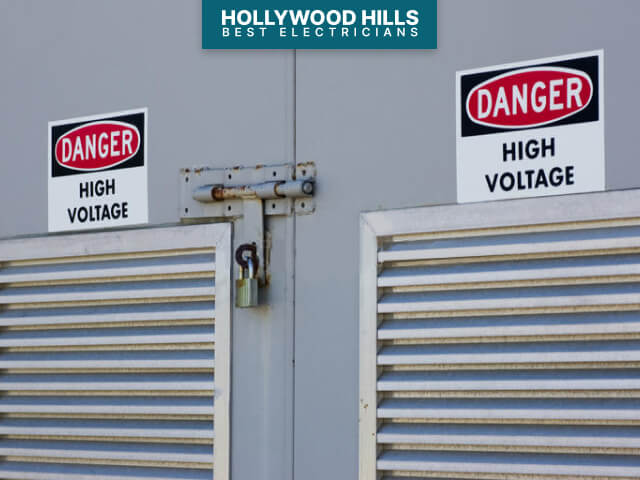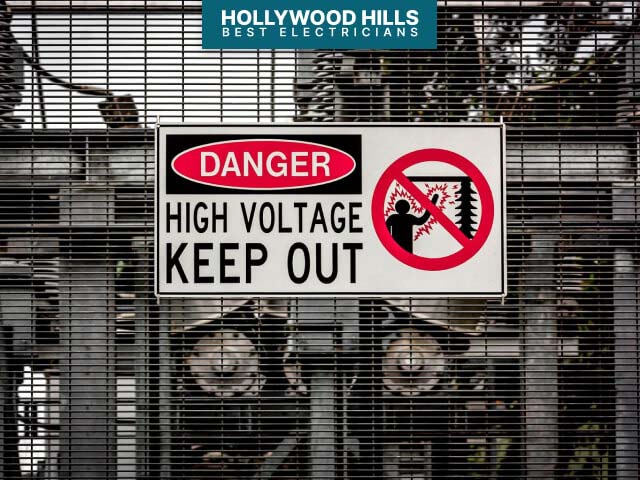Look around you, and whether you are in a rural area or a city, you will see that power lines are a ubiquitous feature in our world. Whether it is a wooden pole delivering electricity to a neighborhood or a massive tower transmitting extremely high voltage, electricians and regular people alike are constantly exposed to electrical risks.
High voltage power lines present a serious risk to anyone living nearby. If damaged, they can release a tremendous quantity of electrical energy, causing catastrophic injury or fatalities to everyone in the area. However, those who are not linemen are rarely warned about the dangers posed by electrical lines. So, it is important to immediately get electrical rewiring services when you know you have a damaged power line at home or notify local officials if it is a community line.
Damaged or not, high voltages pose the same risks to people and properties. Hollywood Hills Best Electricians have compiled three potential dangers caused by high voltage wiring below:
1. High Voltage Can Induce Blackout
Damage to high-voltage power lines might result in widespread power outages. This is due to too much electricity flowing through the system, which can trip the circuit breakers. If the grid goes down, getting power back in the impacted area may take a while.
2. High Voltages Tend to Arc
Compared to lower voltages, higher ones can arc or “jump” across large distances. People need to realize that they can get an electric shock even if they are not touching a live electrical conductor or they come in contact with a damaged wire.
A higher voltage allows for a farther arcing distance. Check out the breakdown in the table below:
- 1000V or 1kV current can arc across 1cm of an air gap.
- 10kV current can arc across 10cm of an air gap.
- 25kV current can arc across 25cm of an air gap.
3. High Voltage Increases the Risk of Fire
If high-voltage electrical lines are damaged, they threaten human life and can also start fires due to the high current levels. Unintentional short circuits might result in a fire or possibly an explosion. High voltage systems also produce far more heat than lower voltage ones, but the latter does not mean any fire hazard either.
Anyone working with or near high voltage needs to be alert to their immediate surroundings at all times. It is because the discharged electrical current might spark a fire in combustible items like dry leaves or grass. It might also cause serious injuries to people and animals.
If you see someone working with or near high voltage, stay clear of the area. If you must go near, make sure you are aware of your surroundings and take extra caution. High voltage can be very dangerous, so always err on the side of safety.
5 Safety Tips in A High Voltage Hazardous Area

Most Americans believe that law enforcement, firefighters, and military personnel are the only people who truly “put their lives on the line” daily as they don their gear and head to work. However, people working in highly electrical surroundings are just as vulnerable to risk and loss as those in many risky occupations. Many construction workers and electrical engineers face the daily challenge of working near high-voltage wires at their workplaces.
Each of us needs to keep an eye out for potential dangers. Safe operation of machinery and tools is possible near live power lines with due diligence and planning. We will go through some basic precautions you can take. See our recommendations below:
- Turn Off Electrical Connections
One of the greatest ways to prevent an accident while working with electrical wire is to de-energize the work area. If a power outage or broken wiring occurs, turning off the power to the area provides a safe and reliable backup plan. Most utilities will accommodate this request if the situation permits.
- Wear Non-Conductive PPE
OSHA mandates the use of PPE for any service provider working in a high-hazard, high-conductivity environment. Even if the power is turned off, working with electrical lines poses a risk of electrocution if you aren’t wearing the necessary protective gear. Most power cables are either underground or otherwise hidden from plain sight. In any job, it is important to take safety measures.
Rubber boots, gloves, and insulating padding are all examples of protective gear that won’t conduct electricity. If you can help it, try to avoid working near any metal conductors at all costs.
- Check the Cables’ Colors
While not everything in the globe adheres to the same standards, using different colored cables to denote the voltage they carry is fairly universal. If there is no indicated color, it is better to stop operations and have an electrical wiring expert inspect the area first.
- Remove Unnecessary Pieces of jewelry When Checking Possible High-Voltage Areas
Always use the back of your hand if you must touch the lines while working in a high-voltage area. This way, if you get shocked, you may quickly remove the back of your hand from the wire rather than letting go and risking further injury.
The high voltage could cause electrical freezing, which prevents your hand from responding because your body is contracting. Most jewelry contains metals that can produce an electrical current, so it’s best to take it off before starting work.
- Stay Alert and Do No Work Alone
Trying to work with high-voltage wires by yourself is never a good idea. If an accident does happen, everyone working on the project can help each other out swiftly. Furthermore, it is imperative that you get enough rest every night, preferably the 7-8 hours of recommended sleeping time, before dealing with electrical wires.
A high degree of vigilance can be lifesaving because human mistake accounts for the vast majority of fatal incidents. When you are distracted, you are more likely to make mistakes and put yourself in harm’s way.
If you have other questions about high-voltage wirings, you are welcome to read some of our other blogs for more information. Hollywood Hills Best Electricians would always be happy to guide you over the phone, so connect with us at your most convenient time.

